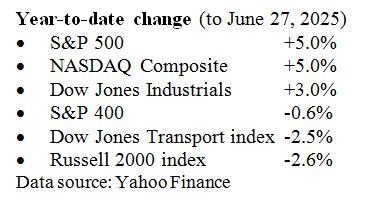by Louis Navellier
March 18, 2025
Last Wednesday, the Labor Department announced that the Consumer Price Index (CPI) rose 0.2% in February and 2.8% in the past 12 months. Economists were expecting a 0.3% rise, so this was a pleasant surprise that caused Treasury yields to decline. The core CPI, excluding food and energy, rose 0.2% in February and 3.1% in the past 12 months. The annual core CPI is now running at its lowest pace since April 2021, just after President Biden entered the White House. Food and energy prices each rose 0.2% in February, although gasoline prices declined by 1%. Owners’ equivalent rent (shelter costs) rose by just 0.18% in February, down from 0.37% in January, yet they still accounted for half of the CPI increase.
Then, the news got even better. On Thursday, the Labor Department announced that the Producer Price Index (PPI) was unchanged in February. Economists were expecting a 0.3% increase, so this was a big surprise. However, the January PPI was revised up to a 0.6% increase (from 0.4% previously reported). Also, the core CPI, excluding food, energy and trade margins, declined 0.1% in February and rose 3.4% in the past 12 months. Wholesale food prices rose 1.7% in February, but two-thirds of this increase was due to chicken and egg prices. Wholesale energy prices declined 1.2%. Wholesale service costs declined 0.2%, while goods prices rose 0.3%. Due to a lack of inflation on wholesale goods, due partly to a strong U.S. dollar and weak economies overseas, any inflation fears based on tariffs can be largely dismissed.
As evidence that America’s recent tariffs on China may not show up in higher prices in America, deflation has re-emerged in China. Specifically, China’s National Statistics Bureau reported that consumer inflation has declined 0.7% in the past 12 months. Excluding food and energy, China’s core CPI declined 0.1%, which is only the second time that China’s core CPI has contracted in the past 15 years.
Here are some more details on the Chinese deflationary trend: (1) the producer price index declined at a 2.2% annual pace, (2) food prices plunged 3.3%, and (3) consumer goods prices have declined 0.9%, while service prices declined 0.4%. In other words, China is in the midst of a deflationary spiral!
In Europe, by contrast, tougher tariff talks began heating up last week after President Trump threatened 200% tariffs on wine and champagne, after the EU moved to impose an import tax on American whiskey. Specifically, Trump said (on Truth Social), “The European Union, one of the most hostile and abusive taxing and tariffing authorities in the world, which was formed for the sole purpose of taking advantage of the United States, has just put a nasty 50% Tariff on Whisky. If this Tariff is not removed immediately, the U.S. will shortly place a 200% Tariff on all WINES, CHAMPAGNES, & ALCOHOLIC PRODUCTS COMING OUT OF FRANCE AND OTHER E.U. REPRESENTED COUNTRIES. This will be great for the Wine and Champagne businesses in the U.S.” This caused CNBC reporter Steve Liesman, to say, “I’m going to say this at the risk of my job. What President Trump is doing is insane, absolutely insane.”
Last week, Canada’s Liberal Party replaced Justin Trudeau with Mark Carney as Canada’s next Prime Minister. He used to head the Bank of Canada and then the Bank of England. Carney has never been elected to any political office until he was selected to become Prime Minister, but Carney told Liberal Party members in Ottawa that, “The Americans want our resources, our water, our land, our country,” and then added, “The Americans should make no mistake. In trade, as in hockey, Canada will win.”
All of this bluster by both Trump and Carney may sound great to their respective political bases, but since the U.S. accounts for 78% of Canada’s exports, Carney has little leverage, so it would be better if the two leaders could meet soon to hammer out a solution to this trade war rhetoric by lowering most tariffs.
Since many investors are worried about tariffs, I think it is important to look at the longer-term picture, which is that Commerce Secretary Howard Lutnick will only be imposing retaliatory tariffs if our trading partners do not lower their tariffs and/or agree to onshore more of their manufacturing in America. The fact that Lutnick is now meeting with Ontario Premier Doug Ford, who suspended his threatened retaliatory 25% electricity tariffs, is a good sign that Lutnick is moving fast to diffuse the confusing tariff situation. I discussed tariffs and our Commerce Secretary when I appeared on Fox Business on March 6.
The Fed Meets Today Amid Lower Treasury Rates
This week marks the second of eight annual meetings of the Federal Open Market Committee (FOMC). The silver lining in the recent market chaos is that Treasury yields have plunged, so I expect tomorrow’s FOMC statement to be dovish and that the FOMC dot plot will signal two key interest rate cuts. In reality, that will be the minimum, as I expect a global crash in interest rates, led by China and followed by the rest of Asia and Europe. The U.S. will be the slowest to cut key interest rates, but since the Fed cannot fight market rates, it will have no choice other than to get in-line with market rates by cutting 3-4 times.
Fed Chairman Jerome Powell clarified that the Fed will likely wait for “greater clarity” on the impact of tariffs before making further key interest rates decisions. Specifically, Powell said in a speech before the U.S. Monetary Policy Forum that the White House “is in the process of implementing significant policy changes in four distinct areas: trade, immigration, fiscal policy, and regulation” and added, “It is the net effect of these policy changes that will matter for the economy and the path of monetary policy.” Powell said the economy is in “a good place” with a “solid labor market,” and inflation is moving back to target.
In Europe, Germany’s political crisis persists, since its Green Party is objecting to the budget that the CDU and SPD parties proposed for infrastructure and military spending. Incoming Chancellor Merz continues to ignore the AfD Party, which earned the second most votes after his CDU party. Essentially, this makes it hard for any type of political center to emerge in Germany to create a ruling coalition. This crisis is expected to hurt the euro and cause the European Central Bank (ECB) to cut their rates further.
Ceasefire Negotiations (and the War) Between Russia and Ukraine Continue
Russia has retaken Sudzha, the largest town in Ukraine’s Kursk region. It is widely perceived that Russia wants to fully control the Kursk region before it agrees to any ceasefire. President Trump’s envoy to the Middle East, Steve Witkoff, has been dispatched to Moscow to meet with Vladimir Putin to try to get Russia to agree to a ceasefire, so negotiations can commence. The good news is Putin is calling for direct talks with President Trump, so that should facilitate a ceasefire and eventual settlement. Officially, the Kremlin said there were reasons to be “cautiously optimistic” about a settlement to the war in Ukraine.
Putin said on Thursday that he “supports the idea” of a 30-day ceasefire that the U.S. has proposed. However, Putin said that any ceasefire must lead to a final settlement of the conflict that would “solve the root causes” of the Russian invasion. There is no doubt that Putin want to control the Kursk region where Ukrainian troops are retreating. He does not want Ukrainian troops to regroup for another offensive. Russia also wants Ukraine to recognize annexation of four partially occupied regions in the Southeast as well as Crimea. Putin also demands that Ukraine not join NATO as a precondition to a ceasefire.
Secretary of State Marco Rubio announced on Tuesday that Ukraine supports a 30-day ceasefire after meeting with senior Ukrainian officials in Jeddah, Saudi Arabia. Prior to this ceasefire announcement, Ukraine launched a massive 337 drone attack on Russia, including 91 drones aimed at Moscow. Russia then responded with an air attack on Kiev. The U.S. has restored military aid and intelligence sharing to Ukraine. Rubio has been insisting that Ukraine must give up territory if it wants a peace agreement.
The post 3-18-25: Inflation Remains Flat, Despite Tariff Threats appeared first on Navellier.






